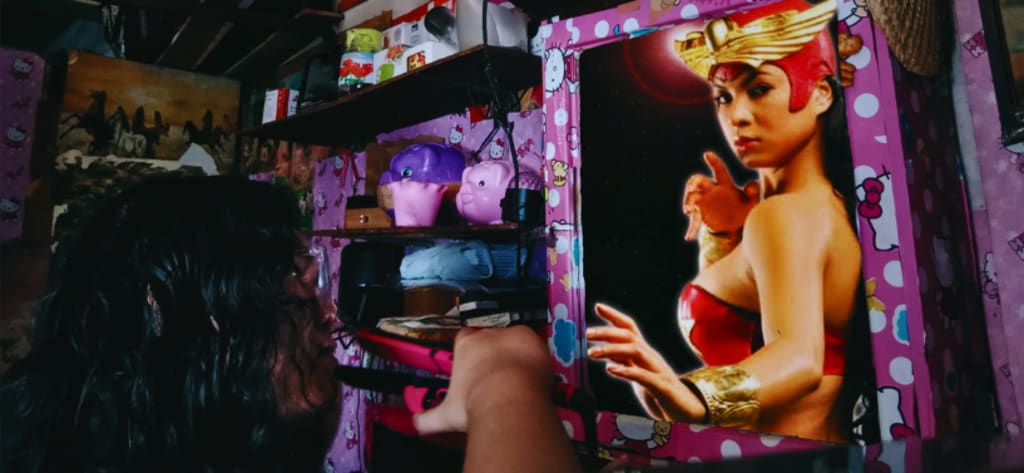ONCE A DING BECOMES A DARNA OF HER OWN
Before Darna becomes Darna, she is an ordinary girl named Narda first

Conforming to the macabre adoration with macho-egotistical action stars became a prerequisite in a male-dominated household. Yet, growing with a queer heart, I had canonized Darna as a standard of my choice. I cravenly put on hand-made costumes resembling Darna, almost choked in a yakee gumball, and reimagined scenes from a recently-released episode. My paranoid parents took this interest hysterically, but in my case, I wanted to be like Darna—her femininity reflecting in mine and her actions are stepping stones to a greater adventure I aspire to traverse.
Dramatic as it seems, I questioned what I can offer that is equally as good as what Darna does. I started at the basics—cleaning the house, washing the dishes, helping on the farm, and even comforting friends who were mourning the death of their pets. I jokingly uttered: "don't cry, you can just have a new one." Insensitive as it sounds, we still exchanged smiles and watched the worms fed off their pets' bodies. That moment, I felt like I could save anyone in sorrow, so I became a false hope machine, it validated what I did.
When we moved to Manila, I had been exposed in a city that seemed pretty different to how others visualized it was. The gritty landscape showed vulnerabilities evoking from people living in dark alleys, who have been failed by the societal standards that only those who have privilege can surpass. I grew compassion for these people, especially for the children whose innocence was tainted by suffering.
Motivated, I subscribed my efforts to different organizations and met people of different backgrounds. The false hope machine ignited spewing plethora of advices they do not need, furtherly talking about nonsense things. I found convenience in overlapping layers of pity, victim status, and even agreement. That's how I thought empathy works—usually concluding the scene in a rescue moment, the validation of my superheroine journey. But what I do not get, is that most of the time, people do not need rescuing, they just need to be understood and heard instead.
That what makes empathy somewhat different from sympathy—the purest form you can empathize is if you get to listen to them and we can assess the situation later on. Although sympathy can also be not wrong, because for most of us, this is the most convenient way we can offer comfort and assurance to a person. But sympathy is a band-aid fix, and without the proper understanding of the situation, your sympathy might come across as superficial. Perhaps, this is due to how most wanted to save others, be a hero for them, or because we feel like that is always the right thing to do.
I'd admit that when I started my affair as a journalism student, I always wanted to be the voice of the people. Documentaries from mainstream and alternative press encouraged me to continue forwarding the causes and demands of the masses. But I find it difficult to distinguish empathy and sympathy, which worries me especially if in the future, I get to cover heavy stories. For instance, a relative of EJK victim cried during our interview for a documentary we were producing at that time. I had no definite direction on what to do, but frankly, you do not need to hysterically do anything, but just listen to them. After all, these people, regardless of their situation, still are human beings. And we get to minimize the harm we might inflict to them.
In the end, the talk about sympathy and empathy always find a familiar way going back to me. It has woven a kind of embrace in the grotesque sculpture of what life I plan to become. But what we have right now left me grappling with understanding that it always end up in providing people a space to breathe and process their feelings. That is when we get to transform our relationships with others and our emotions as well.
After all, before Darna becomes Darna, she is an ordinary girl named Narda first. Narda's experiences and struggles become her weapon to pursue on amplifying spaces and hearing the plea amid the chaos brought by both human and immortal rivals. Her ordinary lived became an instrument into fostering a solution that could potentially offer a great chamber for people's safety. Simply, what we have right now, all our ability is a great treasure in understanding what other people experience. Not all the time, we are the Darna we envision, we can still be as powerful as we can even if we are a Narda in our possession.
Note:
- Darna is a Filipino superheroine serving as a symbol of heroism, patriotism, and justice.
- Narda is her mortal alter ego of Darna. Narda becomes Darna when she swallows a white stone and shouts the word, "Darna!"
- Ding is the boy sibling of Narda.
About the Creator
John Michael F. Odtohan
A writer, student journalist, advocate for queer rights, and aspires to work in film and TV production. Fly high, Trans Pinay!
Enjoyed the story? Support the Creator.
Subscribe for free to receive all their stories in your feed. You could also pledge your support or give them a one-off tip, letting them know you appreciate their work.






Comments
There are no comments for this story
Be the first to respond and start the conversation.